From entertainment and education to healthcare and real estate, virtual reality (VR) transforms how people interact with digital environments. As VR technology develops, new levels of involvement, accessibility, and immersion are unlocked. The future of VR app development continues expanding, the industry investigates cutting-edge features like hyper-realistic graphics, real-time interactivity, and integration, also developing with other technologies. This article explores The Future of VR App Development: Trending Trends and Technologies of Virtual Reality (VR) App Development in 2025, development steps, essential tools, and the best VR Development Platform.
What does Virtual Reality mean?
Virtual Reality (VR) is a technology that provides an immersive and interactive experience that allows users to visualize and understand complex concepts, simulate human experiences, and explore virtual worlds. This is used to connect entire worlds, as is the case in the Metaverse.
Future of Virtual Reality
The future of virtual reality is predicted to increase significantly as technology advances, creating immersive metaverse experiences. Presently at 10.8 million units, virtual reality device sales are expected to reach 23.8 million by 2025.
Hyper-realism, which simulates real-world physical sensations like smell and temperature, is also gaining traction. Another emerging trend is integrating artificial intelligence (AI) in VR, which will analyze user behavior to build more personalized and responsive virtual environments.
How to Build a Successful Virtual Reality App: A Step-by-Step Guide for Beginners
Creating a VR app can be a complex task, especially for beginners. Here’s a simplified guide to help you kickstart your journey:
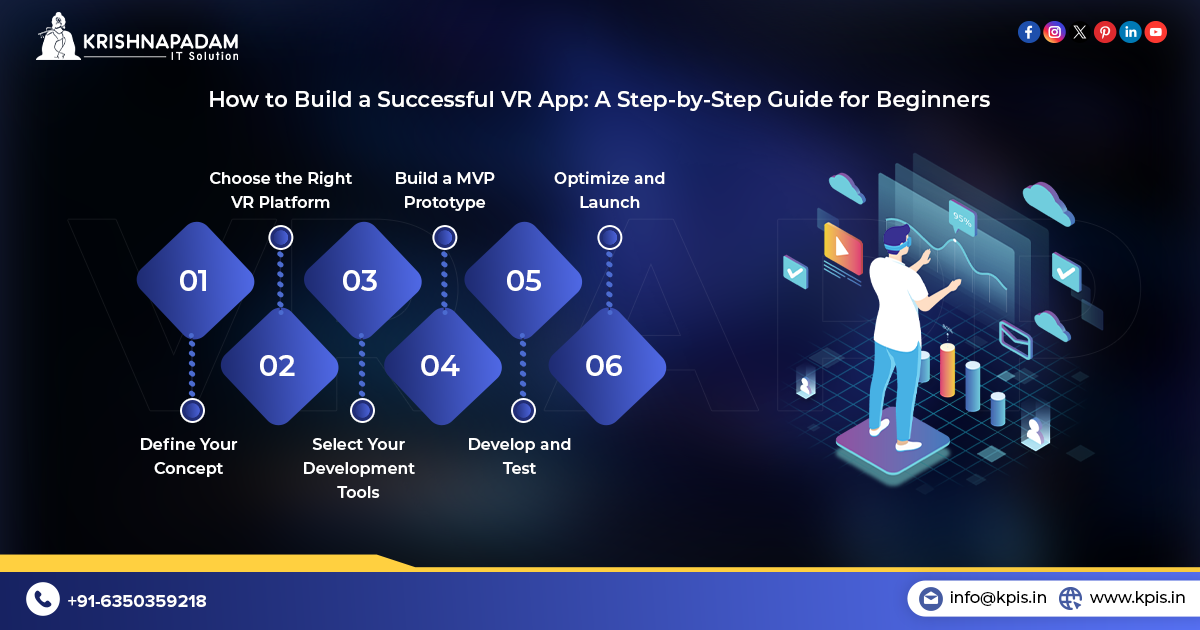
Define Your Concept:- Understand your target audience and create a unique value proposition for your VR apps. Analyze competitors and outline essential features that will make your app stand out.
Choose the Right VR Platform:- Select which VR devices (e.g., Oculus, HTC Vive, PlayStation VR) you want to support. Various platforms have diverse requirements, so choose the best that serves your vision.
Select Your Development Tools:- Unity and Unreal Engine are popular choices for VR app development. These platforms deliver robust tools and assets to make the development process smoother.
Build a MVP Prototype:- Begin with a minimum viable product (MVP) to test elementary functionalities and user experiences. This helps in identifying and addressing challenges early on.
Develop and Test:- Build your VR app in steps, focusing on various areas such as user interaction, background design, and performance optimization. Test on real VR hardware to determine potential bugs.
Optimize and Launch:- Optimize your app’s graphics and performance to provide a smooth, immersive experience. Ultimately, launch your app on the platforms such as SteamVR or the Oculus Store.
VR App Development for Various Industries: Top Advantages
VR technology has far-reaching applications across various industries, each with unique benefits. Here’s how VR is driving value across multiple sectors:
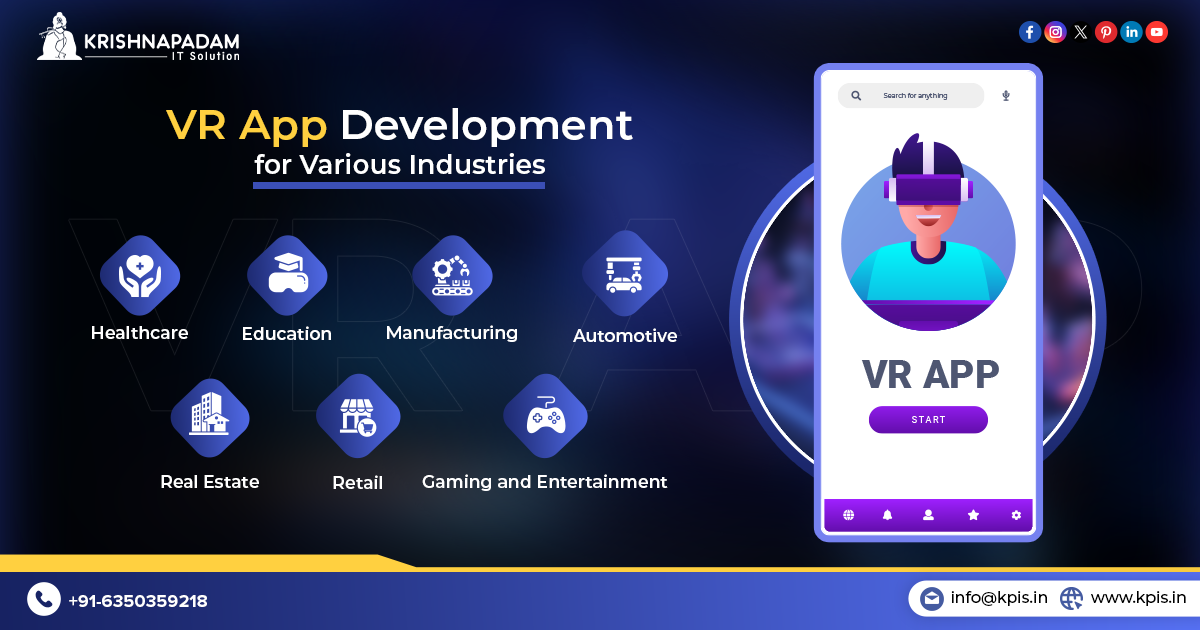
Healthcare:- VR is used in healthcare for surgery simulation, mental health treatment, and rehabilitation. It delivers a secure and controlled environment for training and therapy, decreasing threats and improving patient outcomes.
Education:- VR is transforming education by providing immersive learning experiences. It enables immersive learning experiences, allowing students to explore subjects like history, science, and art in a virtual setting. This increases engagement, retention, and understanding.
Gaming and Entertainment:- VR offers gamers an immersive experience, allowing them to become fully immersed in a virtual world. From action-packed games to interactive experiences, VR provides a new way to enjoy entertainment.
Real Estate:- The real estate sector benefits from VR by offering virtual property tours. Virtual tours allow potential buyers to explore properties remotely, saving time and resources for both agents and clients. VR also enhances customer experience and decision-making.
Manufacturing:- Virtual reality enhances training, design, and production processes in manufacturing. Workers use VR simulations to learn complex machinery operations and safety protocols, reducing on-site accidents and improving efficiency. VR helps with product design and testing by creating realistic prototypes, allowing designers to visualize and modify models in a 3D space.
Automotive:- The automotive industry leverages virtual reality for design, manufacturing, and customer engagement. VR allows engineers to visualize and test vehicle designs in a virtual environment, identifying potential issues early in development. Customers experience virtual test drives, exploring vehicle features and configurations without visiting a showroom.
Retail:- VR gives customers the ability to “try before they buy.” Virtual fitting rooms and interactive product displays can increase customer satisfaction and drive sales.
Essential Tools and Platforms for VR App Development
As VR development progresses, developers have access to a broad range of tools and platforms to streamline their work. Here are the top essentials:
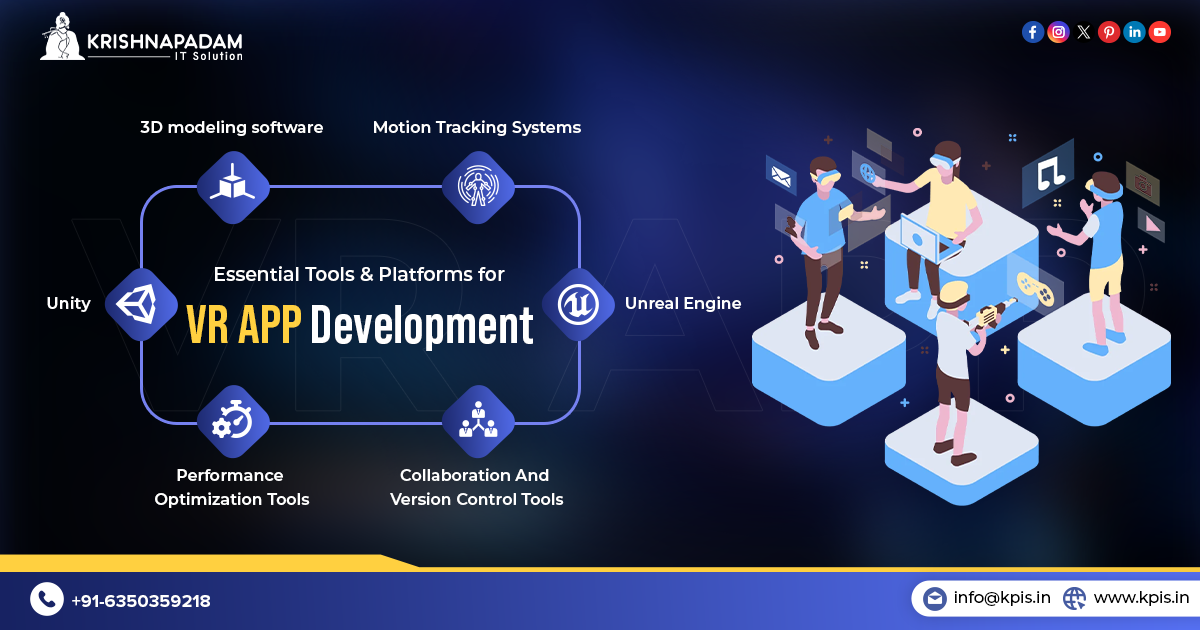
Unity:- Unity’s VR capabilities and user-friendly interface make it a top choice for developers, especially those creating apps for multiple platforms like Oculus, HTC Vive, and more.
Unreal Engine:- Known for high-quality graphics, Unreal Engine is ideal for developers looking to create photorealistic experiences. It’s especially prevalent for gaming and complex VR simulations.
3D Modeling Software:- Tools like Blender and Autodesk Maya enable developers to create detailed and realistic 3D environments and objects. These models are the building blocks of any VR experience, providing the visual richness that users expect.
Motion Tracking Systems:- Integration of systems like HTC Vive trackers or Oculus sensors allows for precise tracking of user movements, enhancing the sense of immersion. Accurate motion tracking is vital for creating intuitive and responsive VR interactions.
Performance Optimization Tools:- It helps identify and resolve performance bottlenecks, ensuring smooth and lag-free experiences. Techniques like level of detail (LOD) management and efficient rendering practices are commonly employed.
Collaboration And Version Control Tools:- Platforms like GitHub facilitate collaboration among team members, enabling efficient project management and version control, which ensures all team members can work on different project parts simultaneously without conflicts.
By leveraging these key technologies and tools, developers can create high-quality VR applications that provide immersive and engaging experiences. Understanding the capabilities and limitations of each tool helps developers make informed decisions, ultimately leading to better end products.
Choosing the Right VR Development Platform: Unity vs. Unreal Engine
Unity and Unreal Engine are both strong contenders in VR app development, each with distinct advantages:
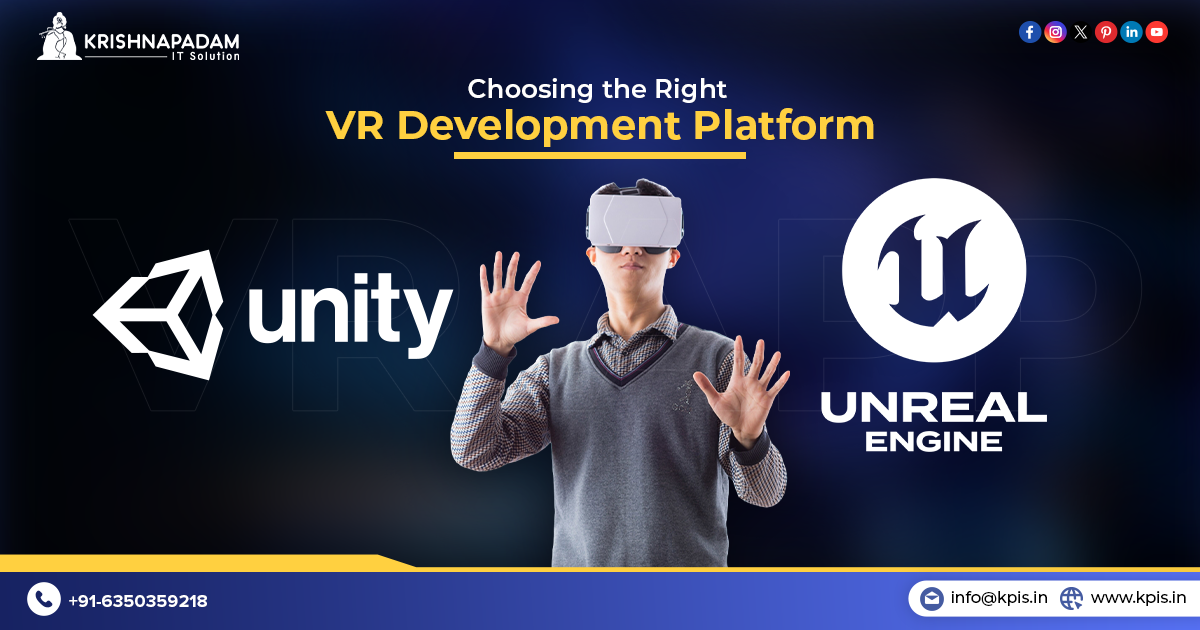
Unity
- Pros:- Offers cross-platform compatibility, a vast library of assets, and strong community support. Unity’s simplicity is ideal for beginners, and it has extensive support for mobile VR.
- Cons:- While powerful, Unity may have limitations in achieving high-end graphics quality compared to Unreal.
- Best For:- Mobile VR apps, AR integration, and applications across various industries.
Unreal Engine
- Pros:- Known for its graphical fidelity and photorealistic quality, Unreal is suited for developers looking to create detailed, immersive experiences. It also offers Blueprint, a visual scripting system that simplifies development.
- Cons:- Unreal has a steeper learning curve and can be resource-intensive, which may impact mobile VR performance.
- Best For:- High-quality VR games, complex simulations, and applications requiring photorealism.
Trending Trends and Technologies of Virtual Reality (VR) App Development in 2025
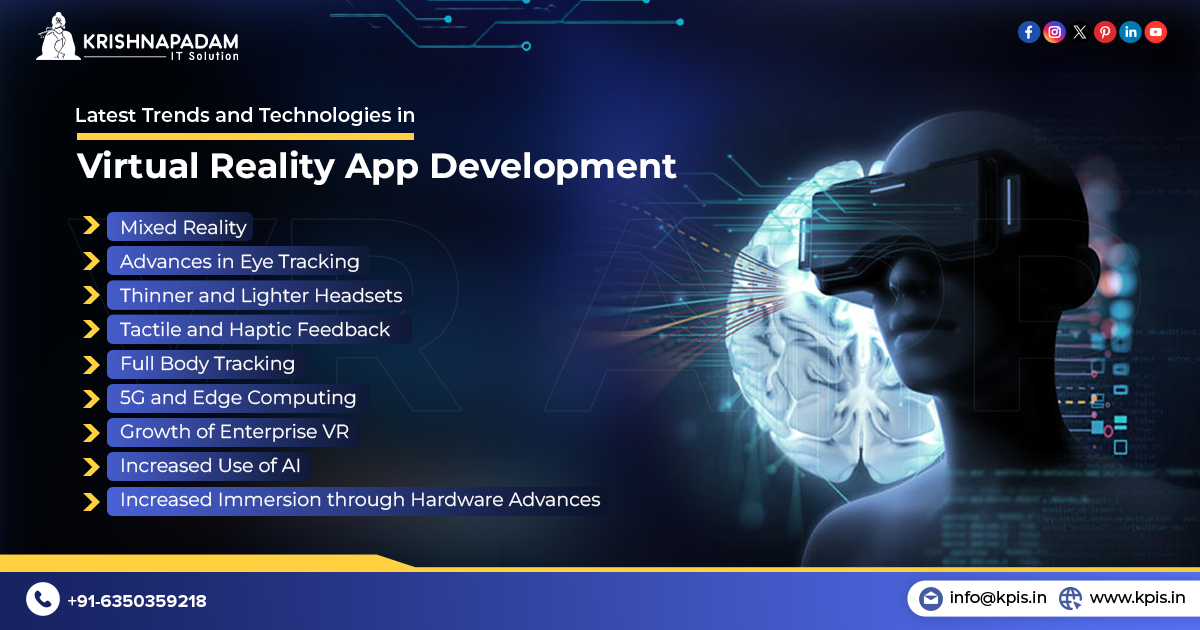
- Mixed Reality:- The lines between VR and AR will continue to blur. Apps will seamlessly combine virtual and physical realities to create hybrid experiences.
- Advances in Eye Tracking:- Eye tracking sensors in VR headsets will enable new gaze-based interactions and improve foveated rendering techniques for performance gains.
- Thinner and Lighter Headsets:- As VR hardware becomes more compact, comfortable, and accessible, the user base and app installs will grow substantially.
- Tactile and Haptic Feedback:- More realistic haptic feedback devices will substantially improve immersion by simulating virtual sensations like touch, pressure, and vibration.
- Full Body Tracking:- Tracking the entire body through sensors or cameras will further enhance presence and enable new applications like VR fitness and dance games.
- 5G and Edge Computing:- Faster network speeds and low latency edge servers will enable real-time rendering, multiplayer VR experiences, and cloud-based VR streaming.
- Growth of Enterprise VR:- More businesses will leverage VR for training, design, marketing, and remote collaboration as the technology matures and costs decline.
- Increased Use of AI:- Advances in artificial intelligence will drive innovation in VR applications through features like virtual assistants, automated content creation, and intelligent simulations.
- Increased Immersion through Hardware Advances:- VR headsets will provide higher resolution, a wider field of view, faster refresh rates, and improved hand tracking. This will create more realistic and immersive virtual experiences.
The future of VR app development is poised for rapid growth and innovation driven by advances in hardware, 5G networking, AI, and new form factors that push the boundaries of immersion and interactivity.
Create The Top-Notch Virtual Reality App With KPIS Pvt. Ltd.
Do you want to present simulated environments for your users within a defined budget? or may know more about Trending Trends and Technologies of Virtual Reality (VR) App Development in 2025. If yes, then you on right place. KPIS Pvt. Ltd. is the leading Virtual Reality (VR) app development company in India, to help your business with future-ready success with our customized solutions. Our team of VR app developers always integrates their expertise and hands-on experience for customized solutions. So, that you get market-focussed and best-in-class mobile and web applications. Moreover, we present customized VR development services that meet your business needs and customize solutions for the same.
Benefits of Choosing Our Virtual Reality Development Services
Cost-efficient
- We ensure competitive prices whilst maintaining the quality of all our projects. We work to fulfill every requirement of our clients in accordance with their budget.
Maintenance & Support
- VR Developers render hassle-free support & maintenance services to our clients to help them resolve their issues and glitches with their expertise.
VR Consultant
- Our adroit VR developers will offer consultation to our clients related to their VR app problems and provide them with great solutions.
Marketing Edge
- As a leading VR app development company, we will boost your brand image before the target audience.
Immersive Experiences
- We take pride in interactive virtual reality application development. We work to deliver an immersive experience for your customers with our expertise.
Wrapping Up
The future of VR app development is rich with innovation. By leveraging cutting-edge tools, choosing the right platform, and tailoring VR experiences to various industries, developers can tap into VR’s transformative potential.
Whether you’re a beginner or an experienced developer, understanding the evolving landscape of VR technology will be crucial in crafting successful, engaging VR applications in 2025 and beyond. At KPIS, our team of experienced VR app developers and analysts integrate VR technology into your business after closely analyzing your industry, competitors, and target audience.
Have queries or want to know more about our virtual reality app development services or Trending Trends and Technologies of Virtual Reality (VR) App Development in 2025? Partner with us to bring your brand’s interactions to life and enjoy incredible success in the digital space.
